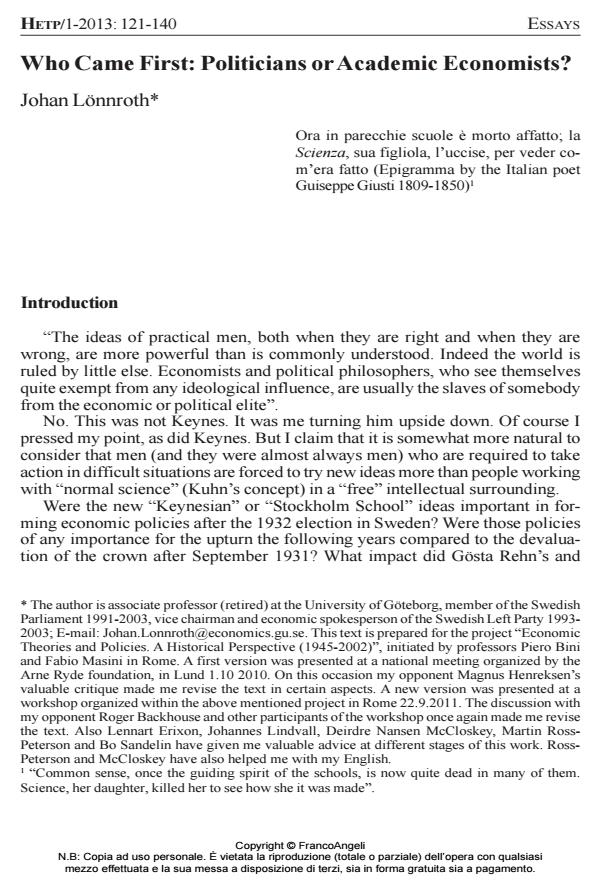Who Came First: Politicians or Academic Economists?
Titolo Rivista HISTORY OF ECONOMIC THOUGHT AND POLICY
Autori/Curatori Johan Lonnroth
Anno di pubblicazione 2013 Fascicolo 2013/1 Lingua Italiano
Numero pagine 20 P. 121-140 Dimensione file 111 KB
DOI 10.3280/SPE2013-001007
Il DOI è il codice a barre della proprietà intellettuale: per saperne di più
clicca qui
Qui sotto puoi vedere in anteprima la prima pagina di questo articolo.
Se questo articolo ti interessa, lo puoi acquistare (e scaricare in formato pdf) seguendo le facili indicazioni per acquistare il download credit. Acquista Download Credits per scaricare questo Articolo in formato PDF

FrancoAngeli è membro della Publishers International Linking Association, Inc (PILA)associazione indipendente e non profit per facilitare (attraverso i servizi tecnologici implementati da CrossRef.org) l’accesso degli studiosi ai contenuti digitali nelle pubblicazioni professionali e scientifiche
In this text an analysis is presented concerning who were first to form and accept new macroeconomic policy ideas in Sweden: economic politicians or professional economists. Those ideas were later to be accepted in international mainstream economics. Four paradigmatic shifts, all of them connected to economic - unemployment and/or inflation - crises, are studied: 1) The so called New Economics in the 1930s; 2) the forming of the Rehn & Meidner model and its implementation in the 1940s to 1960s; 3) the gradual shift from Keynesianism to monetarism and norm based theory during the last three decades of the 20th century; 4) the effects on economic thinking of the crisis in 2008/09. The result is that in cases 1, 2 and 4 initiatives to change policies rather came from politicians than from academic professional economists. In case 3 the result is more uncertain.;
Keywords:Sweden, politicians, economists, ideas
Jel codes:A11, B22
- Augello M. and M. Guidi (eds.)(2001). The Spread of Political Economy and the Professionalization of Economists, London and New York, Routledge
- Augello M. and M. Guidi (eds.)(2011). The Economic Reader: Textbooks, Manuals and the Dissemination of the Economic Sciences during the 19th and Early 20th Centuries, London and New York, Routledge
- Blyth M. (2001). The Transformation of the Swedish Model: Economic Ideas, Distributional Conflict and Institutional Change, World Politics, 54(1): 1-26. DOI: 10.1353/wp.2001.0020
- Calmfors L. (2009). How Have We Handled the Economic Crisis and What Do We Do Now? The Félix Neubergh Lecture, University of Göteborg, December
- Carlsson B. (1993). The Long Retreat: Gustav Cassel and Eli Heckscher on the 'New Economics' of the 1930s. In Jonung (ed.)(1993): 156-94.
- Carlsson I. (2003). Så Tänkte Jag, Stockholm, Hjalmarsson & Högberg.
- Erixon L. (2011). Under the Influence of Traumatic Events, New Ideas, Economic Experts and the ICT Revolution – the Economic Policy and Macroeconomic Performance of Sweden in the 1990s and 2000s. In Mjøset (ed.)(2011): 265–330.
- Feldt K.O. (1981). Vårt Behov av Normer. In Lundahl (ed.)(1981): 47-54.
- Feldt K.O. (1991). Alla Dessa Dagar, Stockholm, Norstedts.
- Fernholm T. (1960). Idéutveckling, Ekonomisk Politik och Ekonomisk Teori, Ekonomisk Tidskrift 3: 161-84. DOI: 10.2307/3438796
- Fregert L. and L. Jonung (2005). Makroekonomi, (Textbook), second edition, Lund, Studentlitteratur.
- Howson S. and D. Winch (1977). The Economic Advisory Council 1930-1939. A Study in Economic Advice during Depression and Recovery, Cambridge, Cambridge University Press. Doi: 10.1017/CBO9780511983306
- Jonung L. (ed.)(1993). Swedish Economic Thought: Explorations and Advances, London and New York, Routledge. DOI: 10.4324/9780203321034
- Jonung L. (1999). Looking Ahead Through the Rear-view Mirror. Swedish Stabilization Policy 1975-1995. A Summary. Ministry of Finance, report Ds 1999: 9.
- Landgren K.G. (1960). Den 'Nya Ekonomien' i Sverige. J.M. Keynes, Ernst Wigforss, B.Ohlin och Utvecklingen 1927-39, dissertation, Stockholm, Almqvist&Wiksell.
- Lindbeck A. (1968). Svensk Ekonomisk Politik, Stockholm, Bonniers.
- Lindvall J. (2006). The Politics of Purpose. Economic Policy in Sweden after the Golden Age, Comparative Politics, 38:3: 253–72. DOI: 10.2307/20433997
- Lindvall J. (2009). The Real but Limited Influence of Expert Ideas, World Politics, 61, 4: 703-30. DOI: 10.1017/S0043887109990104
- Lindvert J. (2006). Ihålig Arbetsmarknadspolitik?, Umeå, Boréa.
- Lundahl M. (ed.)(1981). Ideologi, Ekonomi och Politik, Tankar i Tiden, Stockholm, Rabén & Sjögren.
- Lundberg E. (1960). Om att Begripa Keynes och att Förstå Andra. Några Marginalanteckningar till Landgrens Avhandling, Ekonomisk Tidskrift 3: 195-205. DOI: 10.2307/3438798
- Lundberg E. (1984). Kriserna och Ekonomerna, Malmö, Liber.
- Lönnroth J. (1988). Ekonomernas Rationella úsiktsbyten 1968-88, Ekonomisk Debatt, 3: 193-202. http://www.ne.su.se/ed/pdf/16-3-jl.pdf.
- Lönnroth J. (2011). Political Economy Textbooks and Manuals and the Origins/Roots of the Scandinavian Model. In Augello and Guidi (eds.)(2011): 285-304.
- Mjøset L. (ed.)(2011). The Nordic Varieties of Capitalism, Comparative Social Research, Volume 28, Bradford: Emerald Group Publishing Limited.
- Notermans T. (2000). Money, Markets and the State. Social Democratic Economic Policies since 1918, Cambridge, Cambridge University Press. DOI: 10.1017/CBO9780511521607
- Persson G. (1997). Den Som är I Skuld är Icke Fri, Stockholm, Atlas.
- Persson T. and G. Tabellini (2004). Constitutional Rules and Fiscal Policy Outcomes, American Economic Review, March: 25-45. DOI: 10.1257/000282804322970689
- Socialdemokraterna (1981). Framtid för Sverige (Future for Sweden), Proposal to the Party Congress on How to Take Sweden out of the Crisis, Stockholm, Tiden.
- Södersten B. and H.T. Söderström (eds.)(2004). Marknad och Politik, (sixth edition), Stockholm, SNS.
- Söderström T.H. (2004). Svensk Stabiliseringspolitik. In Södersten and Söderström (eds.)(2004): 99-139.
- Tanzi V. (2006). Fiscal Policy: When Theory Collides with Reality, CEPS Working Documents No. 246, 16 June 2006. http://aei.pitt.edu/6717/01/1343_246.pdf.
- Tingsten H. (1941). Den Svenska Socialdemokratins Idéutveckling, del I (part I), Stockholm, Tiden.
- Wigforss E. (1954). Minnen (Memories), del III (part III), Stockholm, Tiden.
- Wigforss E. (1960). Den Nya Ekonomiska Politiken, Ekonomisk Tidskrift, 3: 185-94. DOI: 10.2307/3438797
- Åberg C.J. (2006). Berättelser från 1900-talet, Stockholm, Atlantis.
Johan Lonnroth, Who Came First: Politicians or Academic Economists? in "HISTORY OF ECONOMIC THOUGHT AND POLICY" 1/2013, pp 121-140, DOI: 10.3280/SPE2013-001007